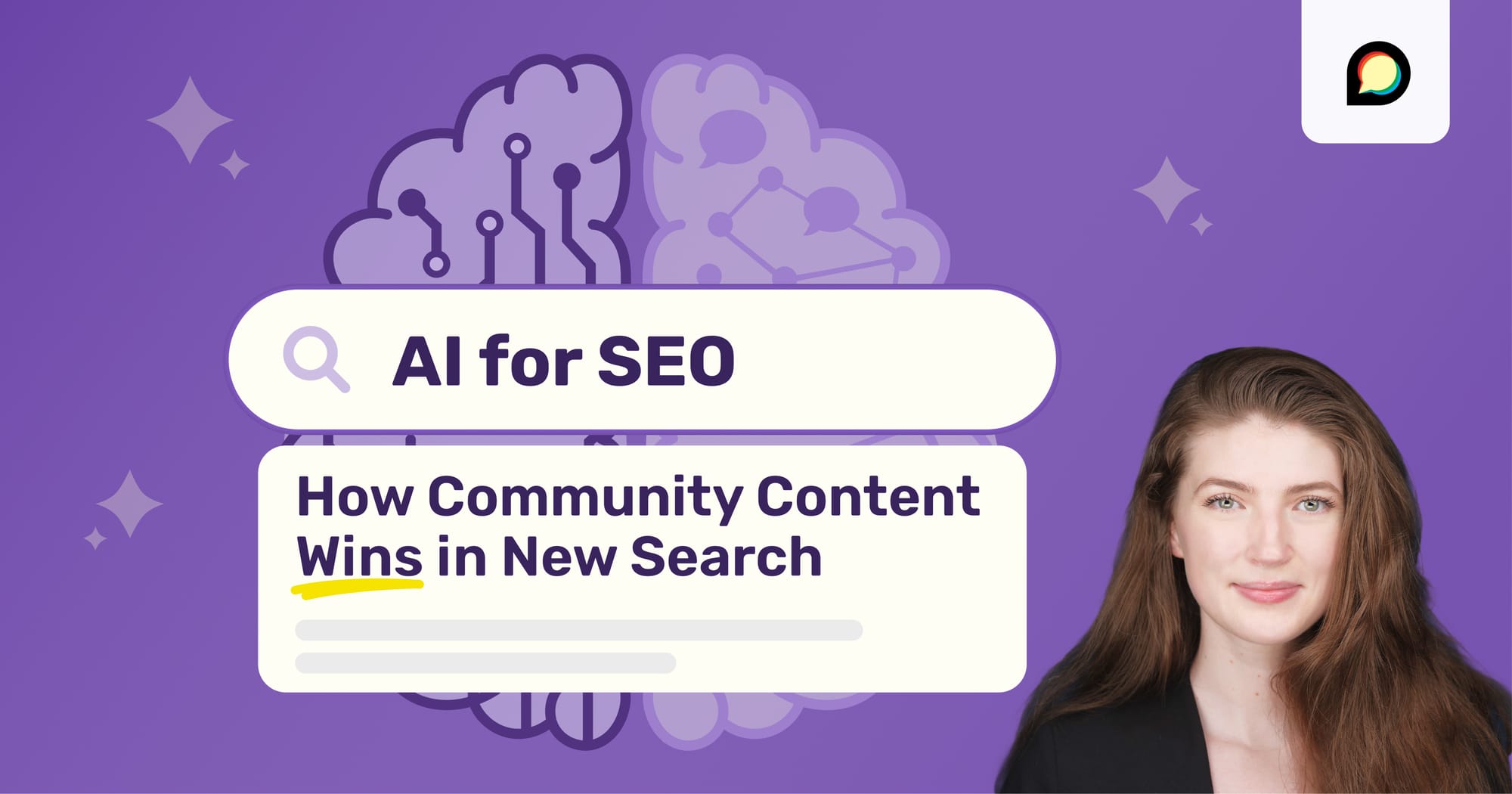SEO for AI: How Community Content Wins in New Search

The Search Revolution is Here
We don’t click on links like we used to.
When an AI summary appears on Google, we visit traditional links only half as often as when no summary is shown. ChatGPT Search, Perplexity, and Google’s AI Overviews have completely reshaped the SERP. Discovery has shifted from “type keywords, click around” to “state the problem, get a referenced solution,” often without leaving the results page. The era of the zero-click search has officially arrived, and in a zero‑click world, being the answer is the strategy.
AI is here, and there’s no going back. Brands need to adapt SEO for AI to ensure their visibility doesn't disappear. The new objective is to be the source that an AI cites.
But there’s one part of the internet that was built to be cited before being cited by AI was even a thing. Online communities and forums are everyone’s unfair advantage in the AI search era.
Why Forums and Communities Have a Natural Advantage
Before social media, online conversations largely happened in forums. The first recorded evidence of this was in 1980 at Duke, where people gathered in Usenet newsgroups. What they didn’t know back then was that the topic-organized threaded discussion framework that is in the DNA of every forum was exactly what artificial intelligence would prefer to crawl more than 40 years later.
Forums are becoming the cornerstone of AI search due to the things they have naturally excelled at since the inception of the internet.
- Natural question and answer format: Forums start where real intent lives, with questions. When someone types a specific problem into search, or asks AI, they’re looking for a direct, usable answer. Forum and community threads naturally mirror that exact behaviour. Titles capture the question, the first reply aims to solve it, and follow-up replies add depth to the final solution. That tight loop between question and resolution makes community content highly discoverable and genuinely helpful for long‑tail queries that traditional SEO polished articles often miss.
- Multiple perspectives: Instead of a single viewpoint, discussions collect experiences from people with different opinions. This surfaces alternatives and genuine discussion around what’s fastest, safest, cheapest, or most scalable etc. The result is a fuller picture that helps readers choose what fits their context.
- Iterative knowledge building: As new tools, data, and edge cases emerge, members update top answers, add examples, and correct outdated guidance. Cross‑links, edit notes, and accepted‑answer summaries consolidate what’s been learned so the discussion becomes more accurate
- Expertise signals: Established community members with proven track records stand out at a glance. These signals help readers triage conflicting advice, reduce risk, and act faster, while transparent profiles and moderation create accountability so the best guidance consistently rises to the top.
- Fresh, updated content: Ongoing conversations surface new releases, breaking changes, and edge cases as soon as members encounter them, while time‑stamped edits, version notes, and pinned updates make recency obvious at a glance. By revisiting and refining top answers—and linking to newer, related threads—the community stays current without losing accumulated wisdom.
So What Do AI Search Engines Actually Want?
The old SEO tricks do not work for AI search. Keyword stuffing and spammy copy don’t persuade a model trained to detect patterns of clarity and usefulness. Forums and well-structured content create the exact signals AI prefers: clear questions, credible answers, visible solutions, and ongoing updates.
AI search engines reward quality over quantity. Models look for authoritative, well‑sourced pages where claims are backed by primary data, citations, and clear provenance.
They also favor context and depth. Short posts that answer only the top‑level question lose to comprehensive discussions that explain the “why,” compare options, list trade‑offs, and cover edge cases. AI search engines want topic hubs that consolidate related sub‑questions on a single canonical page, then use supporting pages for deep dives.
Human expertise is still a major differentiator. AI search engines are like humans in one key respect: they prefer firsthand experiences, failures, and nuance that generic summaries can’t fabricate.
Structure matters to AI, and they favour schema (Article, FAQ, HowTo, Product Reviews). Breaking content into scannable sections with H2/H3s, definition boxes, tables, and checklists will help. The easier it is to parse, chunk, and cite your page, the more likely an AI system is to surface the exact passage and attribute you.
With any luck, we’re about to see the death of SEO spam. Useless articles don’t work when models select passages based on evidence density, not the density of keywords. Instead of chasing variations of a phrase, optimize for clarity, originality, and verifiable proof.
AI search is expected to surpass traditional search by 2028. If you have a public forum or online community for your brand, you are already ten steps ahead of the AI SEO race.
If you don’t, it's time to start one.
